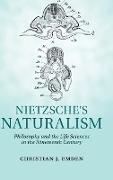Read more
This book examines Nietzsche's philosophical naturalism both historically and philosophically, establishing a link between his discussions of nature and normativity.
List of contents
Introduction; Part I. Varieties of Philosophical Naturalism: 1. Introduction; 2. The neo-Kantian stance; 3. Nietzsche's 'anti-Darwinism'?; 4. Psychology, experiment, and scientific practice; 5. Three kinds of naturalism; Part II. Evolution and the Limits of Teleology: 6. Introduction; 7. Problems with purpose; 8. The politics of progress; 9. Naturalizing Kant; 10. Genealogy and path dependence; Part III. Genealogy, Nature, and Normativity: 11. Introduction; 12. 'Darwinism's' metaphysical mistake; 13. Living things and the will to power; 14. Toward a natural history of normativity; 15. 'Naturalism in morality'; Bibliography; Index.
About the author
Christian J. Emden is Professor of German Intellectual History and Political Thought at Rice University, Houston. He is the author of Friedrich Nietzsche and the Politics of History (2008), and Nietzsche on Language, Consciousness, and the Body (2005), and recently co-edited Beyond Habermas: Democracy, Knowledge, and the Public Sphere (2012), and Changing Perceptions of the Public Sphere (2012).
Summary
Through the encounters between neo-Kantianism and the life sciences in the nineteenth century, this book explores Nietzsche's naturalism and his understanding of normativity. Proposing specific historical reasons for Nietzsche adopting the views that he did, Emden argues that Nietzsche asked questions about naturalism and normativity that are still relevant today.

